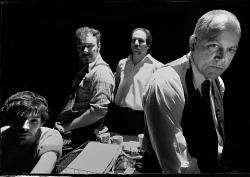A Prayer for My Daughter
The scene for this play is set in a police office in downtown New York in the early hours following 4th of July celebrations. Through the hot summer night, two cops, Kelly and Delasante, interrogate two dope addicts/murder suspects: a punk kid called Jimmy and Sean, a former Vietnam medic, now a teacher of 'eclectic spiritualism.' The latter are wanted for the grisly homicide of old Mrs Linowitz while the former are not averse to roughing up their suspects in order to get a suitable confession. As the cat-and-mouse power struggle of wits and fists unravels, all four men shake up any notions of good and bad, hero and villain. This psychological drama explores background and motivation all the while blurring the boundaries of right and wrong.
A product of the 1970's, the shadow of the Vietnam war is hard to avoid as is the macho swagger. Playwright Thomas Babe's tactics are sometimes a little heavy-handed; the grim use of Independence day is the first of many obvious devices in signifying something is rotten in the United States of America. Indeed, there is something of the farce about the play, reminiscent of Dario Fo's Accidental Death of an Anarchist with the look of Scorsese's Taxi Driver Exploring political relations through personal interactions, morality here is not black and white. Indeed, despite the various literary references to darkness and light, everything seems to emerge in grey overtones after being sucked into some murky moral backwaters.
As the cops try to nail the culprit and a phone call from Kelly's suicidal daughter threatens to overshadow the proceedings, the idea of the traditional masculine hero is turned on its head. Each detective is given time to claw each culprit but by the end of the play the authorities and the criminals seem more like allies than enemies. Babe skillfully evokes their dawning camaraderie as all of the characters reveal their flaws in a corrupt self-fulfilling system that leaves little room for humanity. This is a dark and twisted tale where the young are damned, the old are even more messed up and bitter and yet they all need to cling to one another in order to define themselves.
Giles Cadle's bold set design of concrete stairs and walkways rising over the scruffy precinct are impressive but unfortunately end up feeling like a waste of space as they are barely used. However, the idea of flipping the traditional setup by placing the audience on either side of the stage with the action cutting right down the middle is interesting although somewhat disconcerting, giving a sense of enclosure and claustrophobia (and the mirthful entertainment of watching other audience member's reactions).
Colin Morgan as Jimmy is both hilarious and terrifying as a quivering junkie whose youth and innocence is starting to turn sour. Although he started off to a shaky start he ended up stealing the show, I couldn't keep my eyes off him. Matthew Marsh as Kelly is the quintessential cop of daytime tv, he drinks a little too much, is rather plump and prefers to immerse himself in work than face up to the hard-hitting realities of his personal life. The only disappointment was Corey Johnson's somewhat unconvincing performance as Delasante, the officer who needs a hit to get through his shift, there's was a little too much of the Starsky and Hutch all-American moustached cop about him for my liking.
The line of the play that really hit home was Jimmy's insightful remark that: "this is like wading through mud;" I couldn't have put it better myself. This play is a bit of a slog, like leaving Glastonbury you come out tired, dirty, confused and having used up every ounce of energy trying to maintain balance to avoid slipping (in this case into philosophically muddy waters) - highly enjoyable but with the risk of inducing temporary collapses of the will to live.
What the popular press had to say.....
FIONA MOUNTFORD for THE EVENING STANDARD says, "There aren't really any moments of tension." MICHAEL BILLINGTON for THE GUARDIAN says, "Highly watchable production." CHARLES SPENCER for THE DAILY TELEGRAPH says, "In its attempts at profundity, this is a thriller that often ends up seeming merely pretentious." BENEDICT NIGHTINGALE for THE TIMES says, " Bold, absorbing, uneven play."
External links to full reviews from popular press
The Guardian
The Telegraph
The Times
Originally published on
